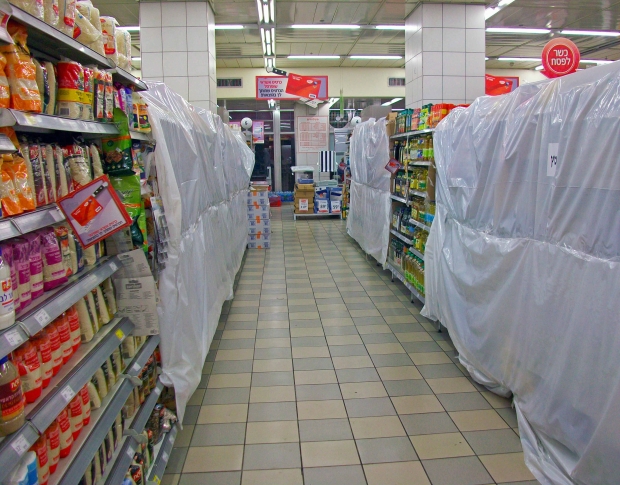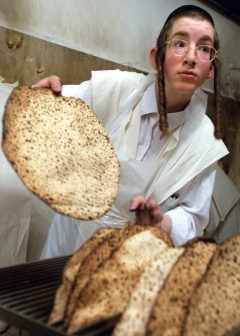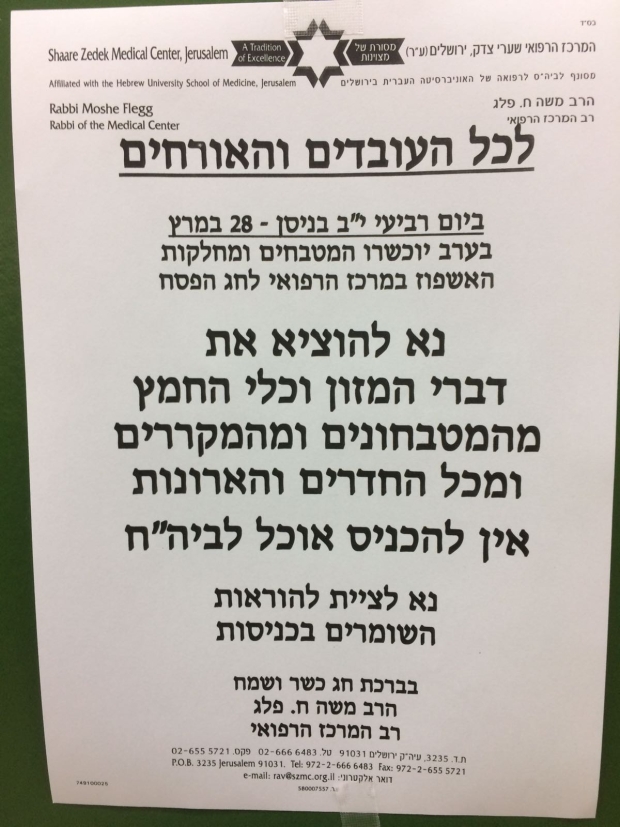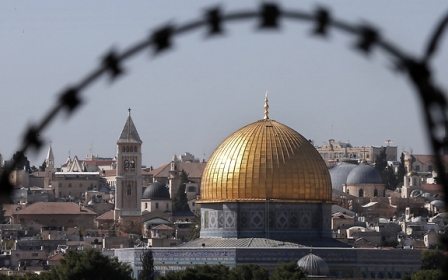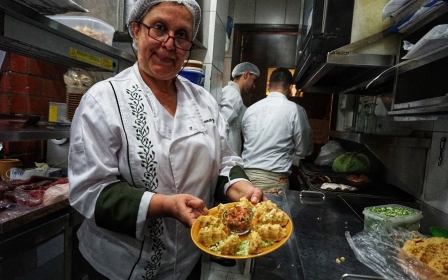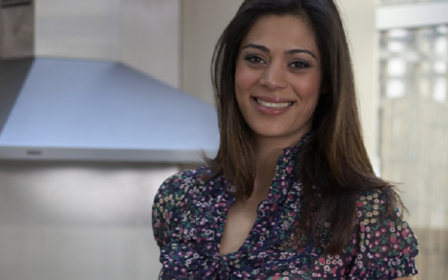'Bread police' scour Israeli hospitals for forbidden Passover food
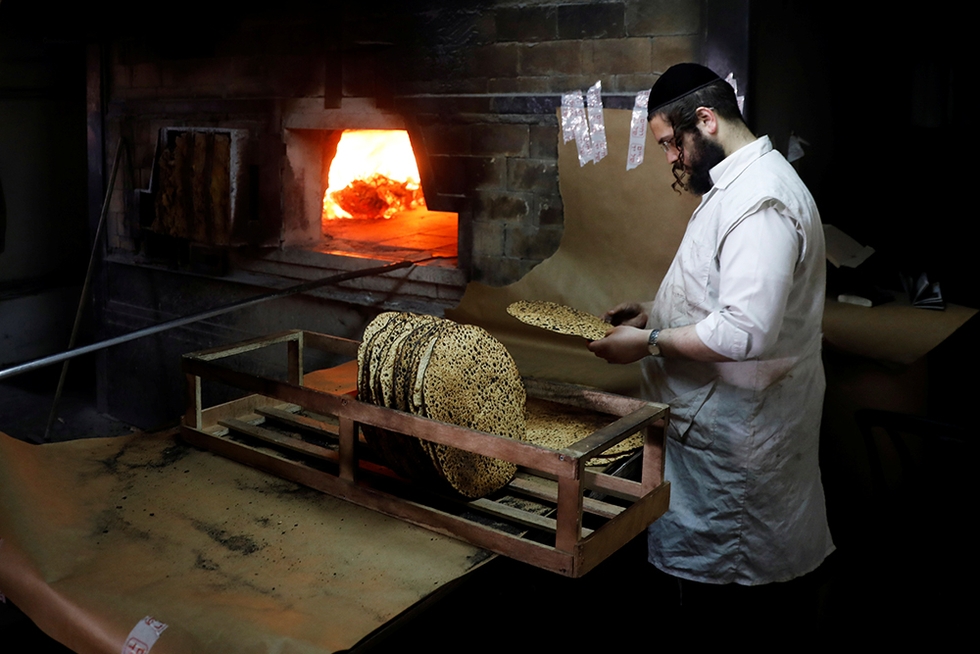
Visitors to Israeli hospitals ahead of the holiday of Passover this week face having their bags searched for sandwiches and leavened food in a move which Palestinians and secular Israelis say subjects them to Jewish religious laws without legal authority.
"The danger is not guns during Pesach, but leavened bread," one Palestinian doctor from occupied East Jerusalem working in an Israeli hospital, who declined to give his real name for this story, told Middle East Eye.
"A week before the holiday, notes were pinned in hospital corridors, near the lifts, and in the kitchens, asking visitors not to bring leavened bread and asking employees to take out all sorts of leavened food from the fridges."
There is no law in Israel that prevents citizens and residents from bringing leavened foods into hospitals
- Sawsan Zaher, Adalah attorney
Passover, which begins on Friday, is a week-long Jewish holiday commemorating the Israelites’ exodus from ancient Egypt. Observant Jews do not consume any food made of grain and water granted time to ferment and rise, as Israelites only ate unleavened bread during that time, according to the Torah.
An essential part of the traditional preparation for Passover is the ritual of "Bi'ur Chametz", literally meaning “cleaning out the leaven”, through selling bread to non-Jews, burning leavened food, and cleaning food cupboards and fridges to remove any traces of leavened products.
Since 1986, an Israeli law known as the Chametz Law has forbidden business owners from putting leavened food on display during the Passover Feast. During the holiday, Israeli supermarkets, therefore, cover up leavened food shelves, hiding products such as cakes, biscuits, noodles, and even beer.
Some Ultra-Orthodox Jewish communities in Israel gather around a fire to burn leavened bread and pasta, and dip cooking utensils in boiling water as part of Bi'ur Chametz a few days before Passover.
Sawsan Zaher, an attorney at the Adalah centre in Haifa, which campaigns for Arab minority rights in Israel, told MEE that this policy was enforced in hospitals nationwide.
"All individuals – including non-Jewish Palestinian citizens – must undergo strict searches at hospital entrances. Any leavened bread products found are confiscated or destroyed,” she said.
“In a number of past cases, individuals who refused to hand over their bread products to security guards were prevented from entering hospitals and visiting admitted family members.”
Adalah filed a petition to the Israeli Supreme Court on 27 February against the Health Ministry’s ban, demanding that the Supreme Court either issue an interim order preventing the Health Ministry from enforcing the ban this Passover, or that it schedule an urgent hearing in order to secure a solution prior to the holiday.
No decision on the matter had yet been issued at the time of publication.
Eyal Bassoon, a spokesperson at Israel's Health Ministry, declined to answer MEE’s questions regarding the ministry's justifications of the policy and whether any hospitals were exempt from the ban.
"The ministry's response to [Adalah's] petition would be given in court, as is customary," Bassoon said.
'Sneaking leavened food into hospital'
Staff and patients spoke to by MEE confirmed that the ban was implemented in hospitals.
A spokesperson for Hadassah Ein Karem Hospital in West Jerusalem, one of the biggest medical centres in Israel, confirmed to MEE that the ban was implemented in the medical centre.
"It is a governmental decision and we have to abide by it, we have no choice," she said. "If you open Haaretz newspaper, you will find a notification calling for cleaning out the leaven in the hospitals among the public (patients and visitors)."
She added that there was no official list specifying which foods were banned and which were allowed.
"The policy says Chametz, but there is no clarification regarding which items are concerned," the spokesperson said, adding that Hadassah offered unleavened food to patients during Passover that was "healthy and nutritional".
A few days ahead of Passover, notes were pinned in Shaare Zedek Hospital in West Jerusalem telling visitors and employees that, beginning on Wednesday 28 March, "all food coming from outside" would not be allowed into the hospital for the duration of Passover, and asking for all leavened food to be taken from hospital rooms, kitchens, fridges, and closets.
"Each time my relatives went to visit me, they were not allowed to bring any Chametz. My husband is originally from Sweden, and he went through intensive search by the hospital's security guards to make sure what type of food he brought."
Although security was tight on leavened food, Michalevicz said that her family managed "to sneak in" Chametz food a few times, as the only kind of bread she could eat at the hospital after giving birth was Matzo flatbread, a dry crunchy bread made without yeast or baking soda consumed especially during Passover.
"It’s shame that a country that considers itself secular forces everyone to accept religious rules," she said. "I imagine that it may be even more difficult for those who are not Jewish."
The doctor spoken to by MEE said that as an Arab Muslim he felt discriminated against by the hospital's imposition of Chametz restrictions.
"You have here what they call the bread police – people working in security, but for a week their mission is to hunt leavened bread. It is surreal," Salameh said.
Salameh mentioned how he once brought lunch to work – kofta and grape leaves, as well as leavened bread – during Passover, in spite of the ban on outside food, and had to eat outside of the hospital premises to avoid trouble with hospital security.
"We ate outside the hospital, not far from view of the security guards. Because we were doctors, they did not say anything and we were frank about having leavened bread. But if it had been a visitor, the situation would have been different," he said.
Zaher from Adalah said she saw the Ministry ban as an "aggressive intervention" of Israeli authorities in private decisions regarding what to eat and where, and a "violation" of human liberty and personal dignity.
"You are talking about vulnerable situations as is the case with hospitalised patients or visiting family members,” she said.
New MEE newsletter: Jerusalem Dispatch
Sign up to get the latest insights and analysis on Israel-Palestine, alongside Turkey Unpacked and other MEE newsletters
Middle East Eye delivers independent and unrivalled coverage and analysis of the Middle East, North Africa and beyond. To learn more about republishing this content and the associated fees, please fill out this form. More about MEE can be found here.


